
























University President Michael Schill has served in his role for just over a month after presidentelect Rebecca Blank stepped down this summer. But what can his past tell us about what he might do as University president?
These are five things to know about Schill that may shape what kind of administrator he is.
Schill’s father worked in a clothing fac tory and his mother was a registered nurse, and neither went to college. But Schill has said he always dreamt of attending college.
He has said his first childhood memory was telling his father he would grow up and go to Harvard University, and his family had no doubt he would eventually attend col lege. The Harvard dream didn’t work out, but Schill ended up at two other Ivy League universi ties: Princeton University as an undergraduate and then Yale Law School.
Schill has said he prides himself on being a first-gen eration college graduate and wants to expand opportunities for other first-generation stu dents at Northwestern.
As president of the University of Oregon, Schill donated his $76,000 bonus to a scholarship for first-generation students in 2018, and in 2021 helped launch a nationwide task force focused on expanding higher education opportunities.
He’s bounced around to a few different universities
Schill began his academic career as an assistant law pro fessor at the University of Pennsylvania’s Carey Law and Wharton business schools,
followed by New York University’s School of Law and Wagner Graduate School of Public Service.
He took his first administrative role in 2004 as dean of the University of California, Los Angeles’ School of Law, beginning a tenure of “highquality leadership,” according to a state ment by the then-chancellor and provost of UCLA.
Schill left UCLA in 2010 to serve as the dean of the Univer sity of Chicago School of Law. The chair of the search committee that ultimately chose Schill said they “hit the jackpot” with his selection, thanks to his careerlong commitment to
In 2015, he became presi dent of Oregon at a time when the university was receiving less money from the state and risking losing its membership in the Association of American Universities, a group of institutions known for their research output. By the end of his tenure, though, the chair of Oregon’s Board of Trust ees said Schill had transformed academics at the university.
Schill has taken a vested interest in housing and planning in cities throughout this career. At NYU, Schill founded the law school’s Center For Real Estate and Urban Policy.
He has often researched the topic through the lens of New York City, investigating issues like the effect of homeownership programs on surround ing property values in the city.
Schill has also researched housing inequal ity — exploring how public housing changes local poverty rates and how the housing market affects the racial and socioeconomic makeup of different neighborhoods.
He’s had a shaky relationship with student activists
In 2017, Oregon students protested Schill’s State of the University speech, making enough of a commotion that Schill had to
to combat fascism.
He has a close relationship with his predecessors
Schill told The Daily last month that former Univer sity President Morton Scha piro has been very “gener ous” to him and that he’s a former student of Scha piro’s predecessor, Henry Bienen.
When at Princeton, Schill took a politics class with Bienen. Today, he holds the position Bienen eventually took on. “They’ve both done incredible things for this University, moved it forward (in) different ways,” Schill said of his predecessors. “And I’m very grateful to both of them for their friendship and their advice.”
later post a prerecorded version of the speech. The students expressed frustration with rising tuition costs, the oppression of historically marginalized students and an alleged rise of fascism and neo-Nazism that made campus unsafe.
Schill took to The New York Times’ op-ed pages to respond. He wrote that he didn’t disagree with the act of protest, but rather with what he saw as purposeful silencing of perspectives.
“Rather than helping people who feel they have little power or voice, students who squelch speech alienate those who are most likely to be sympa thetic to their message,” he wrote.



Schill said he also found it ironic that stu dents trying to fight fas cism stopped a speech, since he believes free speech is fundamental
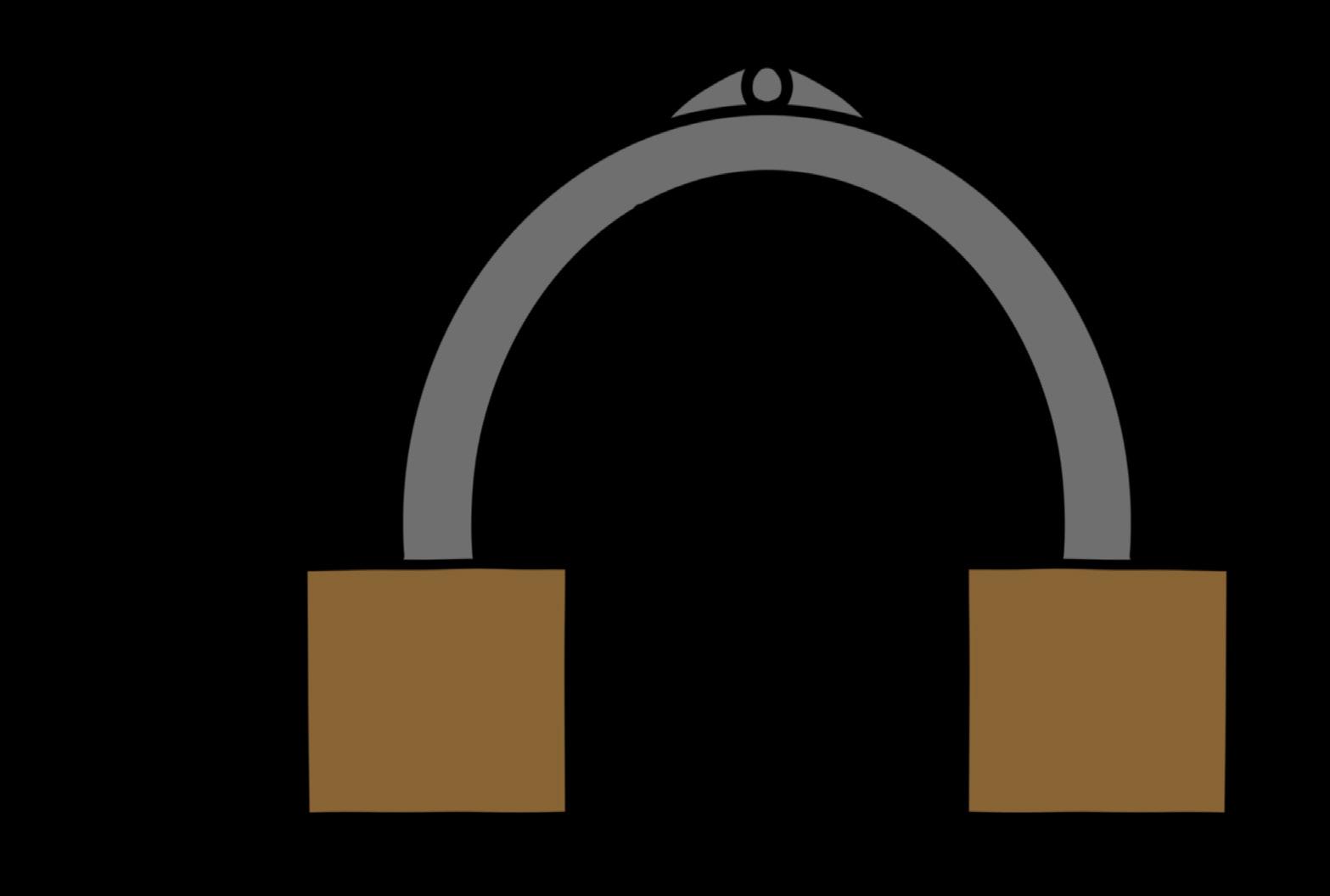 davisgiangiulio2025@u.northwestern.edu
davisgiangiulio2025@u.northwestern.edu

Recognized as a contemporary music vocal virtuoso, Joan La Barbara is credited with advancing a new vocabulary of vocal sounds. Her work has been featured in a variety of settings, from chamber, orchestral, and choral music to film scores and vocal effects. She visits the Bienen School for discussions, master classes, and performances of her work.
Joan La Barbara’s residency is generously sponsored in part by Northwestern University’s Kreeger Wolf Endowment, the Sound Arts and Industries program, the department of Art Theory and Practice, and Comparative Literary Studies program.
CONTEMPORARY MUSIC ENSEMBLE Saturday, October 22 7:30 p.m. Galvin Recital Hall, $8/5
Joan La Barbara’s Awakenings, plus Elijah Smith’s Scions of an Atlas and David Lang’s Jimi Hendrixinspired tuba concerto, Are You Experienced?
JOAN LA BARBARA COMPOSITION COLLOQUIUM Tuesday, October 25 5 p.m. Regenstein Master Class Room, free La Barbara discusses her compositions as well as the experimen tal and extended vocal techniques she has developed over her career.

NORTHWESTERN UNIVERSITY CHAMBER ORCHESTRA Saturday, October 29 7:30 p.m. Pick-Staiger Concert Hall, $6/4
A program exploring fear, death, and the supernatural, which includes La Barbara’s In solitude this fear is lived as well as music from the film Psycho and Manuel de Falla’s El amor brujo.
University President Michael Schill has an exten sive background in higher education, serving as dean of the University of Chicago Law School from 2010 to 2015 and as president of the University of Oregon from 2015 to 2022. During his time at Oregon, he reformed school policy on many fronts, including on-campus policing, diversity and inclusion, financial aid and the right to protest.
Here is where Schill stands on these issues and others.
In November 2020, Schill reduced the number of armed University of Oregon Police Department officers by 26%. But the same policy increased the number of unarmed Community Ser vice Officers on campus by nine. Schill said CSO officers would wear “easily recognizable” attire instead of policestyle uniforms.
“I understand that to some mem bers of our community — particu larly people of color — an armed police force generates a feeling of oppres sion and a lack of safety,” Schill said in a statement to the Oregon community.
Schill also said he would never fully dis band the police department. He said the uni versity was trying to balance the need for reform to address police brutality with the need to prevent crime on campus.
At Oregon, Schill launched the Inclusion, Diversity, Evaluation, Achievement, Leadership framework. Schill said in a news release that the framework, which applies to policies in and out of the classroom, would help the university make diversity, equity and inclusion a reality through increasing diversity in student recruitment and attracting scholars of diverse backgrounds.
In November 2016, Schill and Oregon Senior Vice President and Provost Scott Coltrane encouraged each administrative unit, school and college at the
university to create a Diversity Action Plan in line with the goals set in place by the IDEAL framework.
Throughout Schill’s tenure at Oregon, the percent age of undergraduate students of color increased from 25.6% during the 2015-16 academic year to 34.1% during the 2021-22 academic year, according to the university. During the same time period, the percentage of white undergraduate stu dents increased from 59.6% to 61.3%, and the share of undergraduates not from the U.S. decreased from 13.8% to 2.9%.
Between 2015 and 2022, Schill nearly doubled Oregon’s endowment, which jumped from about $700 million to $1.3 billion. In comparison, during former University President Mor ton Schapiro’s 13-year tenure at NU from 2009 to 2022, he more than doubled the University’s endow ment from $5.8 billion to $12.2 billion.
During Schill’s tenure at Oregon, he also increased total student financial aid to $43
“What is increasingly important is that people like me, who come from modest backgrounds, have sufficient financial aid, and we make sure as a country that everyone is educated, which opened the world for me,” Schill told the Chicago
Schill, a first-generation college graduate, also led a $3.24 billion funding campaign for Oregon. The campaign began prior to Schill’s tenure in 2014, but the university increased its financial goal in 2018. The university raised money for the campaign through 147,000 donors who contributed 552,000 gifts. Funds went toward construction and renovation, student support and faculty and academic programs.
During an address by Schill to Oregon in 2017, a group of 45 protesting students, identified as members of “the UO Student Collective,” stormed the stage. The protesters condemned rising tuition fees and an alleged rise of fascism on campus.
Following the event, Schill wrote an op-ed for The New York Times titled “The Misguided Student Crusade Against Fascism.” In the piece,
Schill defended freedom of speech and the right to protest, but said it was ironic that the protestors condemned fascism while not allowing his address
In 2015, Schill met with mem bers of Oregon’s Black Student Task Force after a series of protests calling for increases in hiring of Black faculty members and more courses in Black studies.
He said he was able to meet and discuss the group’s demands, resulting in the creation of the Black Cultural Center. Although some members of the task force said they weren’t satisfied with the progress made, Schill said he was glad to see those protests turn into meaningful change.
Similar to other universities across the coun try, Oregon closed its campus following the initial COVID-19 outbreak. Under Schill, during fall 2020, the university hosted some in-person operations with many restrictions, such as a remote or hybrid model for classes with more than 50 students.
In May 2021, Schill announced the university would require all students and staff to take the COVID-19 vaccine. In December, he added the COVID-19 booster shot as a requirement.
Similar to NU’s COVID-19 protocols, masking was no longer required in most campus spaces at Oregon during spring 2022.
Throughout the pandemic, the university provided free COVID-19 tests and KN95 masks for its students.
Oregon also developed the Corona Corps under Schill. Established in June 2020 in Ore gon’s Center for Global Health, the nization partnered with University Services to give students opportunities to contribute to the pandemic public health response by assisting with COVID-19 contact tracing in Oregon. The group was renamed the Oregon Public Health Corps in July.
pavanacharya2025@u.northwestern.edu
Editor in Chief Jacob Fulton eic@dailynorthwestern.com
General Manager
Stacia Campbell stacia@dailynorthwestern.com
Holly and John Madigan Newsroom
Phone | 847.491.3222
Campus desk campus@dailynorthwestern.com City desk city@dailynorthwestern.com
Sports desk sports@dailynorthwestern.com
Ad Office | 847.491.7206 spc-compshop@northwestern.edu
The Daily Northwestern is published Monday and Thursday during the aca demic year, except vacation periods and two weeks preceding them and once during August, by Students Publishing Co., Inc. of Northwestern University, 1999 Campus Drive, Evanston, IL 60208; 847-491-7206.
First copy of The Daily is free, addi tional copies are 50 cents. All material published herein, except advertising or where indicated otherwise, is Copyright 2020 The Daily Northwestern and pro tected under the “work made for hire” and “periodical publication” clauses of copyright law.
POSTMASTER: Send address changes to The Daily Northwestern, 1999 Campus Drive, Evanston, IL 60208. Subscriptions are $175 for the academic year. The Daily Northwestern is not responsible for more than one incorrect ad insertion. All display ad corrections must be received by 3 p.m. one day prior to when the ad is run.



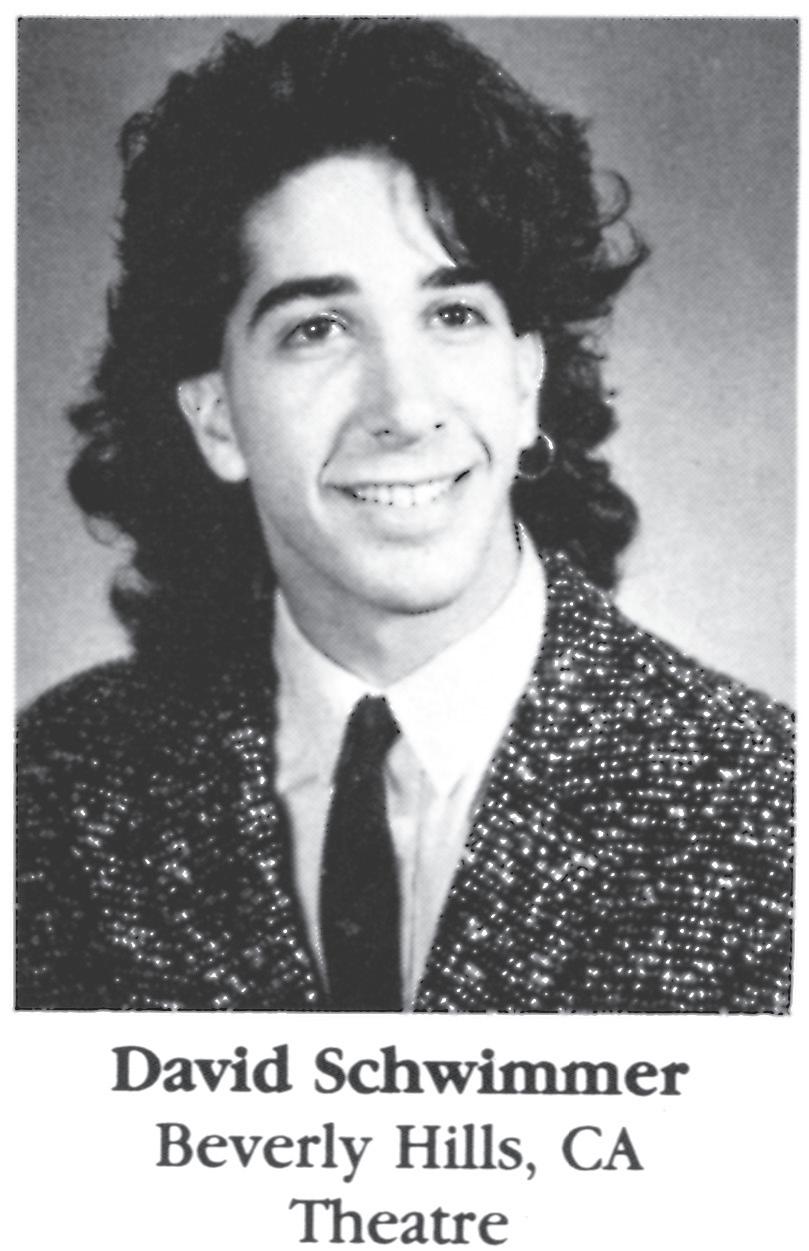
PHOTOGRAPHERS WILL BE IN NORRIS FOR A LIMITED TIME. Several poses will be taken – in your own clothes and with cap and gown. Your choice will be available for purchase. All senior portraits must be taken by Prestige Portraits/Life Touch. $10 sitting fee required.
Monday Nov. 1 through Friday, November 20 @ NORRIS Sign up at: www.OurYear.com NU Code: 87150 questions? email: syllabus@northwestern.edu or go to: www.NUsyllabus.com
His appointment and arrival was unlike that of any of his predecessors. But Michael Schill, Northwestern’s 17th University president, is taking everything in stride.
Schill, a New York native, came to NU from the University of Oregon, where he served as president for seven years after stints as the law school dean at the University of Chicago and University of California, Los Angeles. His return to Chicago was much faster than a typi cal onboarding process.
Rebecca Blank, who the presidential search committee initially selected to succeed former University President Morton Schapiro, stepped down from her role as president-elect due to health concerns in July. Schill was announced as her replacement exactly one month later — just weeks before the start of Wildcat Welcome.
As a result, Schill had to speed through the transition process to start on Sept. 12, with Schapiro staying on due to the extenuating circumstances. While universities often fill high-level administrative roles months ahead
of a transition date, with a period built in for new leaders to acclimate to the environment, Schill had very little time.
“Usually you come, you’re prepared and then you take another six months of just listening to people before you do anything,” Schill said. “Well, I had a month, and I had to move, get my dog here, finish up what I was doing in Oregon and also try to understand this place.”








Schill credits a wide range of NU staff and administrators with providing him support as he transitioned into the new role.
Part of that process has also included conver sations with Schapiro, who led the University for 13 years. While Schill said he is grateful for Scha piro’s advice and friendship, he differs from his predecessor on at least one important practice.
Each year, Schapiro read the applications of about 500 prospective students — includ ing some with personal connections to him — and gave recommendations about acceptances. Schill told The Daily he does not intend to continue this practice.
“We hire admissions professionals — my job is not to read student applications,” he said. “It’s every president’s prerogative to decide what they want to do, but it would be something that I would rather leave to the experts.”
Schill also discussed the role with another former University president he already knew: NU’s 15th president, Henry Bienen. Bienen taught Schill as an undergraduate at Princeton University, where he taught and served as the dean of the Woodrow Wilson School of Public and International Affairs for years.
Through these conversations, Schill said he has been able to get a sense of NU’s culture and community. Both Schapiro and Bienen informed his approach as he intends to leave his own mark at the University.
“Both of them have the right attitude in giv ing you advice, but expecting you to make your own decision,” Schill said. “I’ll make my own recipe, but they’ve both done incredible things to move this University forward.”
Though he may have expected to embark on a storied law career when he was a student, Schill said it was retrospectively clear that he was meant to work in education.
Reflecting on his childhood, Schill said he was different from many of the kids with whom he grew up — instead of shooting basketballs for fun, he was constructing curricula.
“I was a terrible athlete, but one of the things I did was, I always played teaching,” Schill said. “I always knew that I wanted to teach at some level.”
Senior University administrators delivered updates and fielded questions on Northwestern’s impending redesign of Ryan Field at Wednesday’s Faculty Senate meeting.
After gaining approval from the Board of Trust ees, the University unveiled plans for the stadium’s $800 million renovation last month. The redevel opment is funded in large part by a record-breaking $480 million donation to NU from Pat Ryan (Kel logg ’59) and Shirley Ryan (Weinberg ’61), a por tion of which has been allocated to the redesign.
Provost Kathleen Hagerty said the renovation would not impact the University’s budget for aca demics. NU will invest $124 million in the project, supporting the Ryan family gift, as well as $100 million in additional fundraising and an unspeci fied amount from the stadium’s current revenue.
Hagerty said before the Ryan family made its gift, the University had already allocated the $124 million for upgrades to the current stadium, includ ing repainting it and repairing its plumbing and electrical systems.
“It was really pretty plain vanilla … maintenance stuff,” Hagerty said. “Even after we had invested the $124 million, we would still be left with a 100-yearold stadium that was going to be a problem to take care of.”
While the redesign plans were all but set when he joined NU last month, University President Michael Schill said he supports the investment — especially because with the Ryan family gift, the University’s investment will yield a new stadium instead of an aging one with minor upgrades.
After visiting many stadiums during his tenure as
University of Oregon president, Schill said he felt Ryan Field needed drastic improvements.
“Being president (of Oregon), I went to all the football games away, and ours is worse than any of them,” Schill said. “I’ve never been to a stadium that looks like ours from the inside — maybe the outside is semi-effective.”
While faculty raised concerns about the proj ect running over budget, Schill said he thinks the University should not spend more than the $800 million budget it announced. In case of budget concerns, he said options include obtaining “a big ger gift” from the Ryan family, reducing the scope of the project or ramping up fundraising.
The stadium is slated to open for the 2026 sea son, though Vice President for Operations Luke Figora said the University does not yet have any updates on where the Wildcats will play during the renovation if construction begins in 2023 as planned.
Additionally, as NU looks to break ground on the project, residents in the city’s 7th Ward have continued to raise concerns about noise and light pollution, parking shortages and student conduct as a result of stadium activity.
Figora said the University has been working with a 7th Ward working group to solicit feedback on those issues. The new design’s 12,000-seat ing capacity reduction is one way NU hopes to mitigate residents’ concerns, he added.
“A lot of those (problems) we felt could be solved with a reduction in size as well — things like parking, conges tion, noise and lights,” Figora said.
“This is a trend we’re seeing … reduc ing stadium size across the professional sports and collegiate sports as well.”
University President Michael Schill provided updates on his first month in office and the Organiza tion of Women Faculty presented a motion pushing for pay equity across Northwestern during the Wednesday Faculty Senate meeting.
Schill’s presentation came after he and other senior admin istrators took faculty questions on the redesign of Ryan Field earlier in the meeting.
While he plans to spend several months soliciting community input before
After initially pursuing law, Schill returned to education, first as a professor and eventually as an administrator. Leading an institution is a far cry from teaching in the classroom, but Schill said he also plans to serve as a professor at NU in future years.
The practice will keep him connected with the needs of students and faculty while reminding him of the “magic” of undergraduate instruction, he said. In doing so, he said he also plans to take cues from NU staff and faculty as he shapes the direction of the University.
“That’s what higher education is for — to create knowledge and then transmit knowl edge to the next generation,” Schill said. “I believe that teaching is the highest form of that endeavor … I want the faculty to think that I’m one of them, to listen, learn, see what they’re doing.”
As he looks to the University’s future, Schill remains grounded by his friendship with Blank. Thrust into an unusual situation, Schill said he wants to pay his respects to her as she navigates cancer treatment.
sity of North Carolina affirmative action cases to be among the first on which he voices his opinion as University president.
The case, which the U.S. Supreme Court will hear later this month, will decide whether affirmative action programs at the universities are constitutional. Schill said diversity should be a fundamental value in law, and the academic community has “a lot to lose” if the plaintiffs prevail.
sustainable in the long run, Figora said it is also working toward pricing the new stadium tickets, so the space remains as accessible as possible.
Several faculty asked why NU has not more seriously considered Soldier Field, a multi-purpose stadium about 15 miles from the Evanston campus, as a viable option for Wildcat football.
Building a venue outside of Evanston was “not on the table,” Schill said, especially because hav ing an on-campus stadium is largely a standard among the Power Five conferences, including the Big Ten. A stadium in close proximity also encourages students and alumni alike to engage more with the team and University, he said.
“That’s one of the reasons why we have football in the first place,” Schill said, “We want to encourage school spirit, we want to encour age our alumni to come back … there is a benefit to the campus, to the University from having the stadium here.”
Art history Prof. Rebecca Zorach asked Schill how he plans to engage students in discussions on sustainability
Many environmental initiatives have been “top-down,” she said, not account ing for how climate change tangibly impacts young people. Many experience climate anxiety when reflecting on the planet’s future, she said.
“Climate change is a big component in the mental health issues facing our system,” Zorach said. “One of the big differences between us and (students) is they have more decades to hope to live on this planet.”
Schill said he is happy to engage with student activ ists, including those pushing for fossil fuel divestment. As the University of Oregon’s president, he said he regularly met with students advocating for a range of causes including sustainability and racial equity.
However, when the Oregon administration inves tigated potential opportunities for decarbonization by changing the campus heating system, it found the process would be too expensive, Schill said. With regard to campus improvements at large, Schill said choosing priorities within the University’s limited budget will be key.
The University’s position on college rankings has
selective group of universities — but Schill said these new peers often have larger endowments than NU.
Still, he added, navigating finances at a private uni versity is preferable to navigating them at a public one.
“I was at the University of Oregon,” Schill said, “Go home tonight, (and) be happy because you’re not a public university in a state that doesn’t believe in higher education. This is a much better place to be.”
Faculty Senate also heard a piece of new busi ness from political science Prof. Karen Alter, who presented a public letter from OWF advocating for increased investments in faculty and pay equity across the University. With more than 200 signa tories, Alter said the letter represents about 25% of women faculty at NU.
Alter motioned for members of the Faculty Senate to sign on to the letter, after which another member proposed sending the letter to Senate committees for review. But Alter said OWF’s pre vious efforts have often stalled in committee.
“The Senate is very procedurally slow,” she said. “We couldn’t have brought it to committees because they all dissolved in May, and we wanted to get this letter out when the new year started.”
Senators ultimately voted 31-20 to send the let ter to committee, which will report any conclusions at next month’s meeting.
maiapandey@u.northwestern.eduin my second week, and my feeling, hav
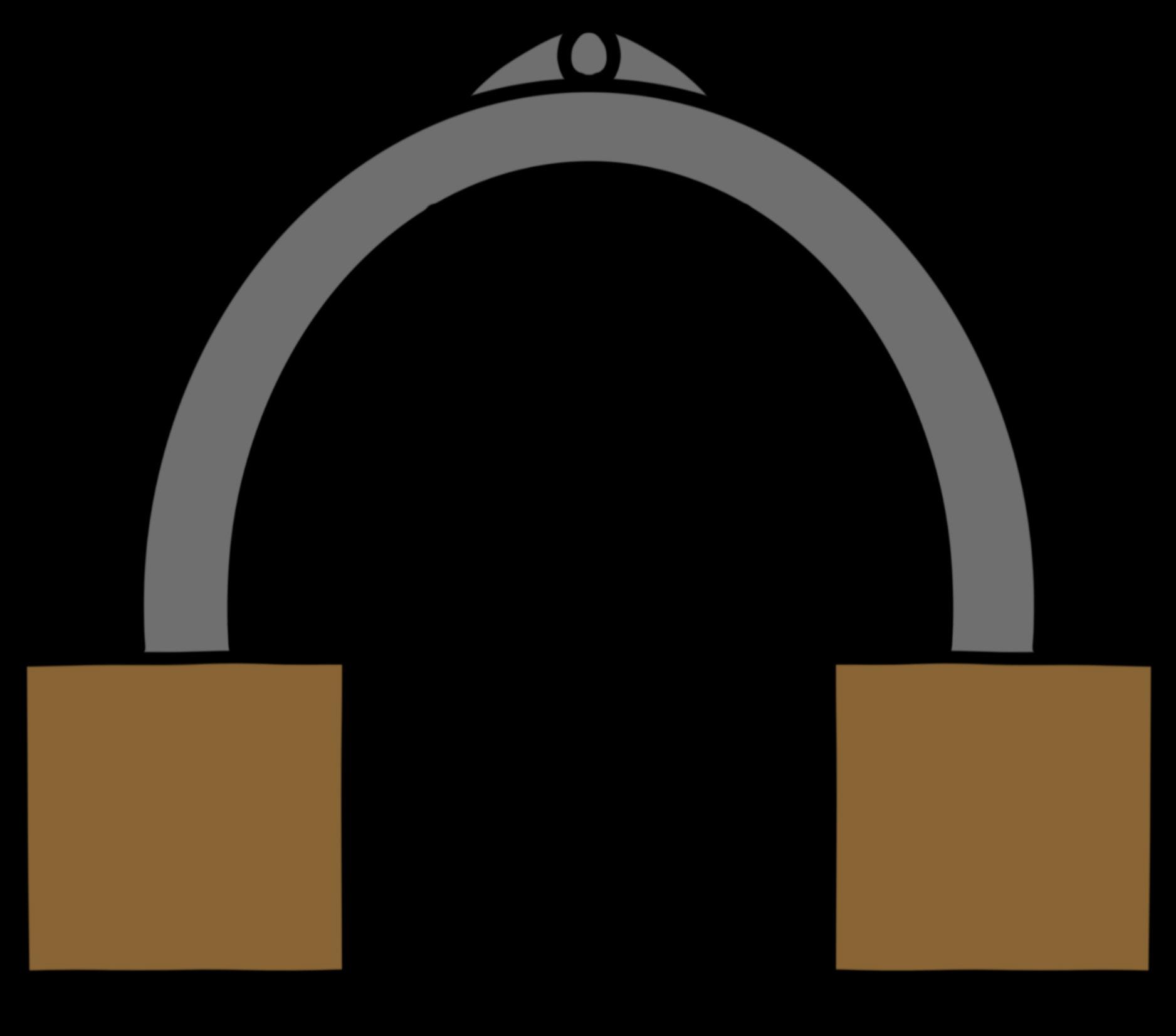
cares about making Northwestern better, he cares deeply about the students here. It’s been a wonder ful relationship and he was chair of the (presiden




Northwestern’s Wildcat Welcome program ming guides freshmen and transfer students through their first week in a new environment. Learning the ins and outs of campus and pre paring for a new academic year often presents a packed, overwhelming schedule.
This year, new students weren’t alone in nav igating NU for the first time. University Presi dent Michael Schill joined in, making some of his introductory appearances as leader of the NU community.
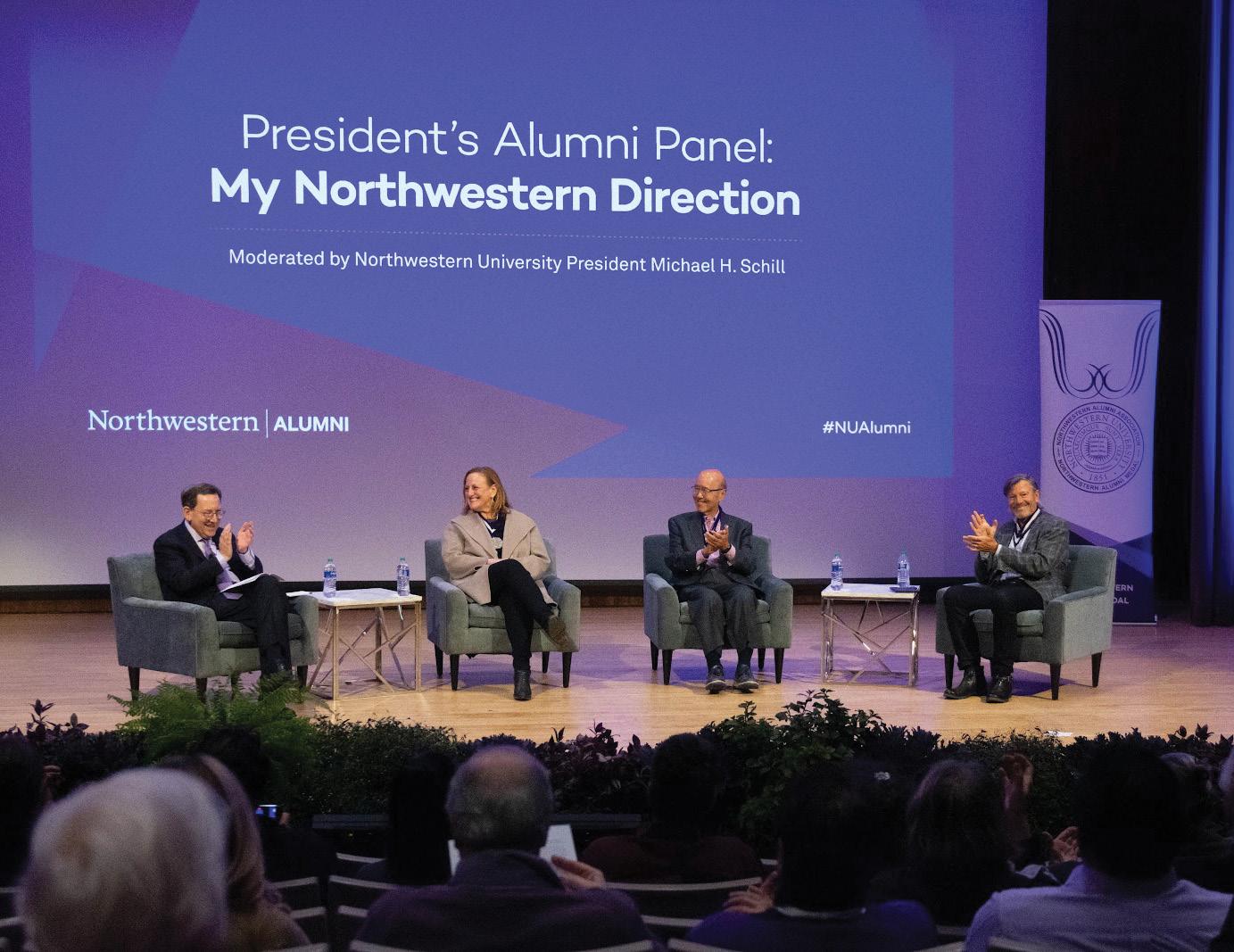
Schill, named the University’s 17th president in August, led students, parents and faculty through traditions like Convocation and March Through the Arch while trying to integrate himself into the University.
Schill’s involvement on campus hasn’t died down since Wildcat Welcome. He’s been spot ted actively interacting with the community, walking his dog on campus and eating lunch with students at Allison dining hall with stu dents last Wednesday.
Some freshmen said they appreciated Schill’s honesty during his orientation speeches, when he admitted he still has a lot to learn about the University culture.
“His speech (at Convocation) essentially said, ‘I’m learning the ropes with you,’ and there was a communal aspect to it all,” Medill freshman Jonas Blum said. “He actually did a really good job incorporating us in.”
Blum said he appreciated Schill’s solidarity in adjusting to a new living situation, friends and campus during the first few days at NU. Schill also tried his hand at relatability not just with students, but with parents and families of freshman and transfer students.
During the President’s Welcome speech, Schill said he shares the daunting feeling of navigating brand-new buildings, courses and connections.
“As your child goes off to dinner tonight with new friends in a new setting, you might understandably be a bit nervous,” Schill said in the speech. “You might be worried about them being the new kid in the school. Trust me, I can relate.”
But through every tradition, Schill priori tized getting to know individual members of his new community. During March Through the Arch, Schill could be seen high-fiving and taking selfies with new students and families.
As Schill stood at the top of Deering Meadow, populated with hundreds of community
members, he briefly addressed new students with a tone of encouragement for their time at the University.
“March Through the Arch symbolizes your entry into the life of Northwestern and a fel lowship of scholars,” he said. “Every one of you belongs here. This is a precious opportunity, and I hope you will seize it to the fullest.”
Toward the end of Wildcat Welcome, Schill addressed freshman and transfer students as the keynote speaker at Convocation.
He maintained his tone of support, saying new students now belong to a “vast, global
network of people who care for and bring out the best in each other.”
“The next few years should be among the most consequential and memorable ones in your lives,” Schill said. “Every professor at this Univer sity wants you to succeed, every administrator, every staff member — that’s why we’re here.”
McCormick freshman Zeeshan Razzaq said Schill had a challenging task in entering the presidency. Quickly taking charge after Uni versity President-elect Rebecca Blank stepped down for health reasons and tackling uncertain issues like the pandemic on campus makes the
job difficult, Razzaq said.
However, Razzaq said he was impressed that Schill fully committed to being part of the Wildcat Welcome experience despite stepping into the presidency weeks before.
“Despite the rigmarole that he’s in, I particu larly thought the speech (at Convocation) was very well done,” Razzaq said. “Highlights of the speech were mostly in his relatability, and he shared his experience as a first-generation college student, so I really appreciated that.”
charlotteehrlich2025@u.northwestern.eduTHE DAILY NORTHWESTERN is not responsible for more than one incor rect insertion of an ad. Corrections must be received by 10am on the day before ad runs again, call 847-4917206. All Classifieds must be paid in advance and are not accepted over the phone. To run online, ad must run in print on same day. The Daily does not knowingly accept misleading or false ads and does not guarantee any ad or claim, or endorse any advertised product or service. Please use caution when answering ads, especially when sending money.
It is the policy of The Daily Northwestern to accept housing advertising only from those whose housing is available without discrimination with respect to sexual orientation, race, creed or national origin. The presumption is therefore, that any housing listing appearing here is non-discriminatory.
THE DAILY NORTHWESTERN is not responsible for more than one incor rect insertion of an ad. Corrections must be received by 10am on the day before ad runs again, call 847-4917206. All Classifieds must be paid in advance and are not accepted over the phone. To run online, ad must run in print on same day. The Daily does not knowingly accept misleading or false ads and does not guarantee any ad or claim, or endorse any advertised product or service. Please use caution when answering ads, especially when sending money.
HELP WANTED ADS are accepted only from advertisers who are equal opportu nity employers. The presumption, there fore, is that all positions offered here are available to qualified persons without discrimination on the basis of race, color, religion, national origin, sex, sexual ori entation, marital status, age, handicap, or veteran status.
SUDOKUComplete the grid so each ROW, COLUMN and 3-by-3 BOX (in bold borders) contains every digit, 1 to 9. For strategies on how to solve Sudoku, visit www.sudoku.org.uk
Since University President Michael Schill took over in September, debates about mental health response programs, parking congestion and Northwestern’s Ryan Field rebuild have dominated conversation among Evanston’s leadership.

While Schill has not announced new finan cial partnerships with the city, he told The Daily he plans to continue working with Evan ston to advance the city’s social and economic goals. Schill intends to continue the Univer sity’s Good Neighbor Fund, which has granted $1 million annually to the city since 2015.
“Evanston is very important to us, so I want to be a strong neighbor,” Schill said. “We are going to find a number of ways to work with them… we are incredibly important to the economy of Evanston.”
Schill comes to NU having served for seven years as president of the University of Oregon. During his tenure, the university forged sev eral partnerships with the UO’s home city of Eugene.
In March, UO announced it will establish an institute to address children’s behavioral health. Similarly, Evanston leaders have been working in recent months to address a lack of comprehensive mental healthcare in the city.
Evanston has partnered with Trilogy Behav ioral Healthcare to provide a 24/7 mental healthcare crisis response hotline and is also in the process of opening a “Living Room,” a no-cost walk-in and call-in resource center for adults experiencing mental health crises.
Still, some experts have said there are not enough local resources for children experi encing mental health crises — and Schill has expressed similar sentiments in Eugene
“A bold effort is needed to address the behav ioral and mental health needs of our youth,” Schill said in March of UO’s partnership with the city.
Though Schill has not announced any plans to invest in Evanston’s mental health resource landscape, Mayor Daniel Biss said he is excited about the background that Schill brings to

tackling issues like mental health.
Biss said he is excited to work with Schill toward their shared goals, such as expanding adequate affordable housing.
Schill has authored three books and several articles focused on real estate, housing policy
and discrimination in the housing market. He has written a casebook, “Property,” which explores real estate and housing policy.
“As the city strives to become more afford able, sustainable, and equitable, I see partner ship with Northwestern as a critical piece of


the puzzle,” Biss told The Daily in an email. “It’s particularly encouraging that affordable housing, an absolutely essential need for our community, is so central to President Schill’s academic work.”

Dave Davis, executive director of Neighbor hood and Community Relations at NU, said Schill hopes to help the city further its afford able housing initiatives.
“Affordable housing… continues to rank high as one of the top issues facing Evanston residents,” Davis said. “(Schill’s) expertise in affordable housing and land use makes him well suited to tackle one of the most pressing issues of our time, especially here in Evanston.”
Schill said investing in a long-term relation ship between the 7th Ward and NU is also high on his list, given plans to rebuild Ryan Field, NU’s football stadium, over the next few years.
In a 7th Ward meeting Wednesday, residents expressed their concerns about the facility’s potential to increase noise and light pollution in the area and worsen parking congestion. NU plans to host concerts and other speaker events at the stadium once it is rebuilt.
NU officials said they have hired a traffic engineering firm to look into potential conges tion issues and create a parking plan for game days. They also said the project will generate 2,900 new jobs during the rebuild and more than $10 million in direct fees to Evanston.

“We’re working deeply with the community,” Schill said. “We’ve already started talking about that, trying to make Ryan feel like a win-win.”
Working with city officials for major con struction projects is not new for Schill: UO is also currently coordinating with Eugene to establish a new football practice facility. Schill helped authorize a land swap with Eugene, an exchange of land between two parties, which ultimately passed after he left the university.
Schill hopes to achieve a similar collabora tion between Evanston and NU while Ryan Field is being rebuilt.
“It will be an incredible stadium, and we want the community around Ryan to be sup portive about it,” Schill said. “We have to make Ryan field something that creates benefits for the community.”
avanikalra2025@u.northwestern.edu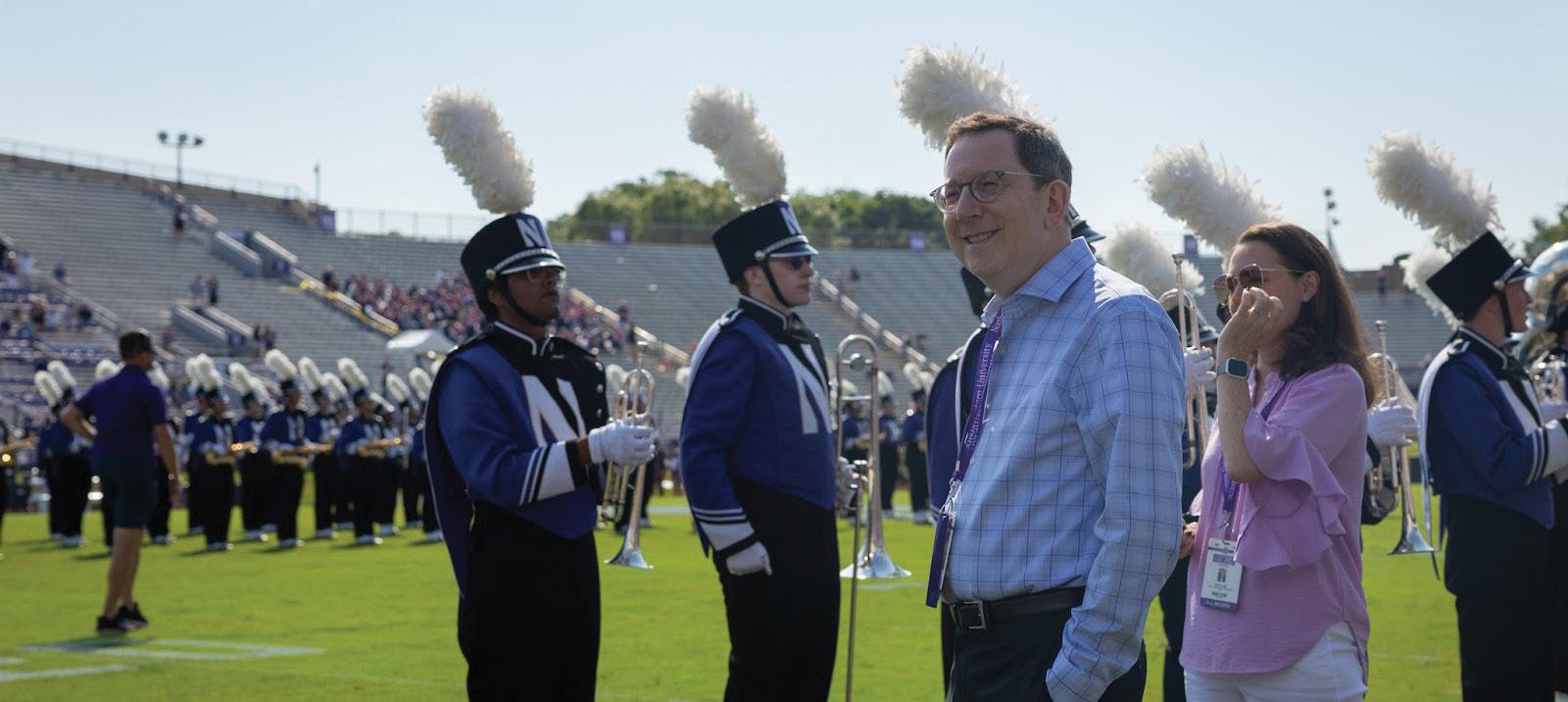
After roles in the law schools at UCLA and the University of Chicago, Schill was tasked with signifi cant responsibility: leading the University of Oregon — including its 18 varsity athletic programs. While athletic director Rob Mullens directly leads the uni versity’s athletic department, Schill had some respon sibility as the university’s president.
A dynamic force in college athletics, the Ducks are well-known for their close relationship with Nike, flashy uniforms and talented track and field and cross country programs. Several different sports recorded NCAA championship titles during Schill’s tenure, including men’s golf, men’s track and field, women’s cross country and women’s track and field.
Here is a breakdown of the biggest athletic moments and developments during Schill’s time in Eugene.
While at Oregon, Schill was one of the most frontfacing university officials in the PAC-12. He served as chair of the Pac-12 CEO Group, comprised of the conference’s nine university presidents and three chancellors, through July 2022. The position rotates among the conference’s presidents and chancellors.
Schill’s tenure as chair coincided with some of the most tumultuous years in the conference’s history.
As the COVID-19 pandemic significantly affected competition, members decided to play a limited, con ference-only football schedule beginning November 2020. The approach was among the most conservative of college athletic conferences nationwide.
Many of the Pac-12’s athletic programs were already struggling financially entering 2020. With out any sort of college football that season, matters would have been decidedly worse. As the Pac 12’s leading university official, Schill was often tasked with explaining the changing dynamics of college athletics during the pandemic.
Despite fiscal woes, Schill told the media there were no financial motivations to returning to play in fall 2020. Rather, the conference relied heavily on the introduction of antigen testing of student-athletes,
which a fellow conference leader said made the return to competition more feasible.
Just one day before Schill’s term as Pac-12 chair ended, UCLA and USC announced their departure from the Big Ten — a move that sent shockwaves around the world of college athletics. While the Pac-12 issued a statement, Schill never publicly addressed the move nor Oregon’s future in the altered conference landscape.
Now, leading a Big Ten school, Schill is on the other side of the UCLA-USC move. While the schools will not begin competing in the conference until 2024, Schill said questions remain about how collegiate athletics will look like then.
“We’re going to end up with two super-confer ences: the Big Ten and the SEC,” Schill said. “What’s that mean? What’s it mean (to have) people traveling from Los Angeles to Maryland or New Jersey?”
As the universities’ move to the Big Ten approaches, Schill said he believes NU will place student-welfare first — even as some peer insti tutions don’t.
There’s a reason Eugene is called TrackTown USA. The Ducks’ cross country and track and field programs have long been a super force in colle giate athletics. Oregon has racked up 32 national championships between its men’s and women’s cross country and track field programs, including six total during Schill’s time in Eugene.
However, the Oregon women’s track and field and cross country programs were also plagued with controversy at the time. In October 2021, several women came forward to decry their data-driven training place, which they said led to nightmares, body dysmorphia and binge eating.
Coach Robert Johnson, who oversaw the pro gram during this time, was let go in June 2022. The university issued a statement about his departure, but did not disclose why he departed.
One of the most iconic venues in collegiate track and field, Hayward Field, underwent signifi cant renovations during Schill’s tenure. Primarily funded by alum and Nike co-founder Phil Knight,
the venue now has a capacity up to 25,000 and facilities such as a training room, a barber shop, indoor pole vault and shot put pits, a nutrition shop and a weight room. Project costs are estimated to exceed $270 million.
The venue also hosted the World Athletics Championships in 2022, marking the first time the event was hosted in the U.S. In a message to the Oregon community, Schill said he was impressed by the way the school welcomed thousands of visi tors as they experienced “Hayward magic.”
The project isn’t too different from the new Ryan Field — another venture mainly funded by an alum’s donation that Schill will help oversee at NU.
Oregon’s women’s athletics programs flourished during Schill’s tenure. The Ducks’ volleyball pro gram reached six NCAA tournaments, softball reached the Women’s College World Series once,
Michael Schill presided over a university with one of the premier football programs in the Pac-12, the Oregon Ducks, from 2015 to 2022. Though the Ducks never returned to their national championship heights of the early 2010s, Oregon appeared in six bowl games in seven seasons and won the 2019 Rose Bowl against Wisconsin.
Oregon’s expectation of contend ing for national championships is something Schill described as a differ ence between his former university’s team and Northwestern, he said in an October interview with the Daily.
“Oregon starts a season think ing it’s going to be the national champion,” Schill said. “It’s always
a contender — it hasn’t yet been (a champion), but always thinks that. I don’t think at Northwestern, we have that high expectation.”
Under coach Pat Fitzgerald, the Wildcats have raised their football program’s profile, winning two Big Ten West titles in the past four years and ranking 10th in the nation in the final AP Top 25 poll in 2020. NU hasn’t suffered losing records in back-to-back seasons since 2014, though the Cats are in danger of breaking the streak with this sea son’s 1-5 start.
While NU has made waves in the Big Ten in recent seasons, Oregon football has become one of the most recognizable programs in the coun try, from its 2011 national champi onship appearance to its bold uni form combinations and connection with Nike.
Schill called Oregon a “national
brand” athletically and said many students’ first impressions of Ore gon are from the football field, while NU is known primarily for academ ics. He also clarified that while the universities have “a different balance between athletics and the academic world,” he believes both dynam ics are valid and essential to their respective school cultures.
“Oregon’s the little state up in the corner that people in New York may have never been to, but people in New York are wearing Ducks sweatshirts, and so that’s how they hear about the school, then they learn about the great academics,” Schill said. “At Northwestern, it’s more likely that they hear about the great academics, and oh, and there’s football, too. It’s just a different uti lization of sports.”
johnriker2023@u.northwestern.eduwomen’s basketball made the Elite Eight three times and Final Four once, women’s track and field won two national championships and women’s cross country won one.
At NU, Schill will get to experience similarly successful women’s college sports. Softball is com ing off a Women’s College World Series appear ance, lacrosse has made three straight NCAA semifinals, women’s soccer is currently ranked No. 5 nationally and field hockey is No. 3 after winning its first national championship in 2021, among other successes.
For Schill, this elite level of competition is particularly inspiring.
“Both schools are incredibly strong in women’s sports,” Schill said. “We see the inequities ( for women’s sports). Hopefully, as more and more people get excited about women’s sports, those inequities will start to dissipate.”
charlottevarnes2024@u.northwestern.eduThe advent of name, image and likeness, the renaissance of the trans fer portal and the shifting landscape of conference realignment have all ushered in a new era of collegiate athletics.
As part of the Big Ten, North western will continue to learn and adapt with the times — something University President Michael Schill understands.
“It’s sort of like a perfect storm of different factors and the future of intercollegiate athletes is really uncertain,” Schill said. “It’s going to look different than it looks today.”
In September, NU announced a pair of NIL initiatives designed to reward student-athletes for their work on and off the field.
The University’s partnership with global sports merchandising brand Fanatics allows Wildcat fans to buy personalized merchandise of their favorite NU athletes. Additionally, student-athletes on scholarship can now accept academic awards as of this year.
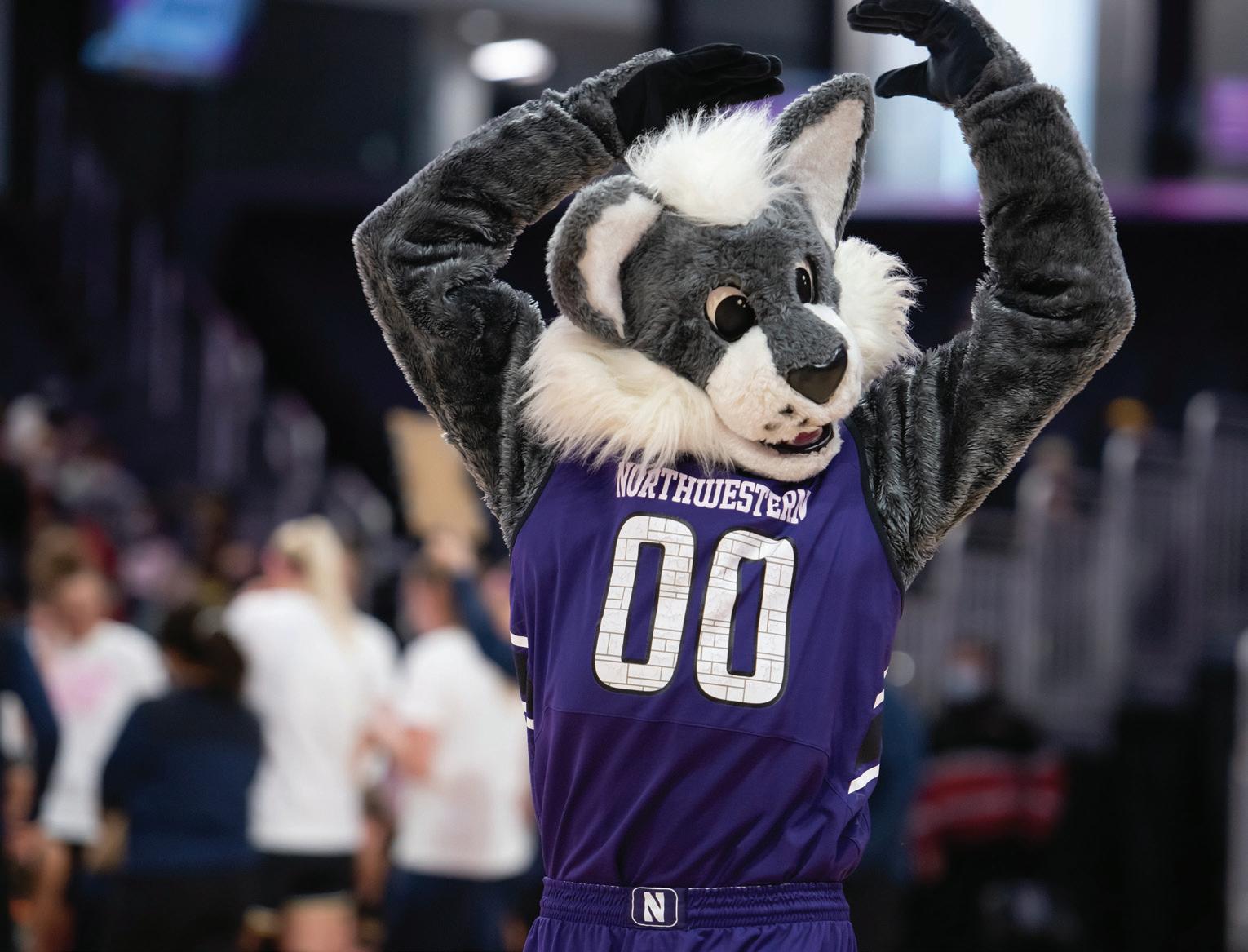
Schill called the current state of collegiate sports “challenging,” but said he believes NIL initiatives are feasible as long as the influence of school boosters is limited.
With extra transfer eligibility due to the COVID-19 pandemic and the one-time transfer rule, the portal has also become a boon for thousands of athletes.
NU knows all too well that the transfer portal can giveth and taketh away. Look no further than exits from football’s Brandon Joseph, baseball’s Anthony Calarco and men’s basket ball’s Pete Nance. Meanwhile, some programs have benefited from the portal, gaining players like Clara Roth on the field hockey team, Sammy Mueller to the women’s lacrosse program and Pat Spencer on the men’s basketball squad.
The ramifications of the portal are not yet fully known, but capitalizing on the talent available should be a pri ority for NU teams in the Schill era.
Schill also mentioned the possible formation of two “super conferences” in the Big Ten and SEC. With the Big Ten adding USC and UCLA in 2024 — and possibly more schools in the near future — the impact of crosscountry travel on student-athletes is a concern, according to Schill.
All in all, there’s more questions than answers right now about the next phase of collegiate athletics. But Schill’s ability to adequately navigate a space that is evolving every day may be paramount to NU’s future athletic success.
Regardless of on-field success or lack thereof, Schill made it clear that NU will continue to prioritize stu dent welfare.
“I believe very strongly that our values at Northwestern are always going to put the student first,” Schill said. “That’s really important, and it isn’t the case at every school in Divi sion I.”